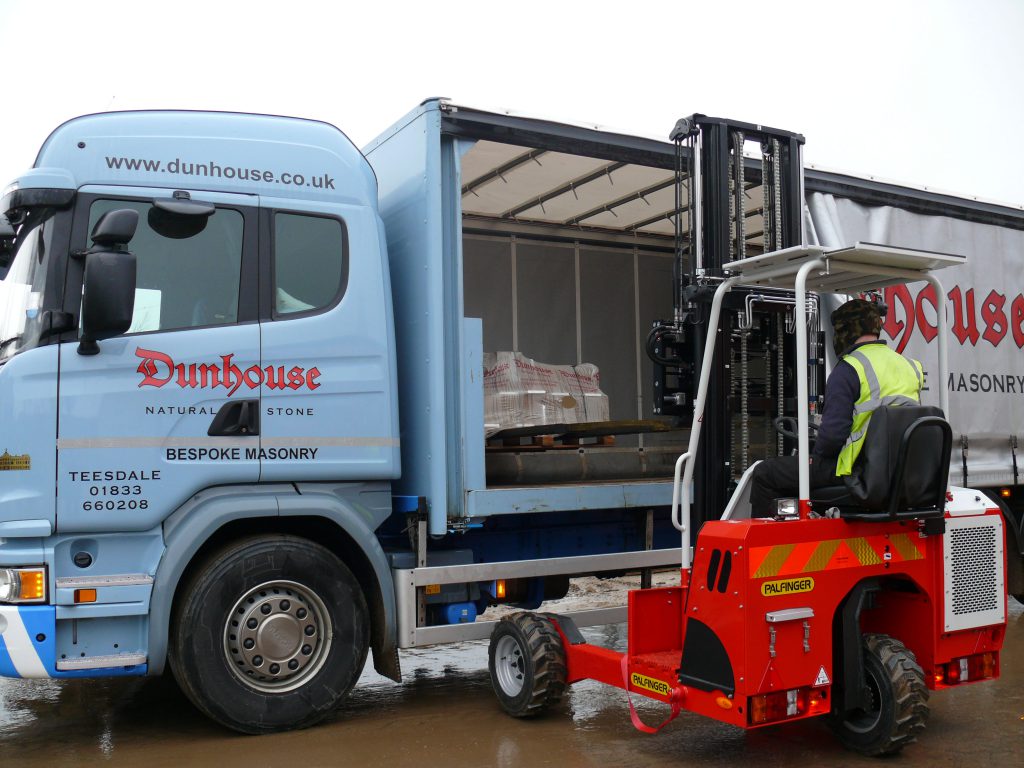Truck Mounted Forklift Loads Better For UK Quarry
24th March 2017

Co. Durham (UK)-based Dunhouse Quarry has recently taken delivery of its new Palfinger truck mounted forklift (TMF), which travels the length and breadth of the country to deliver specialist natural stone and traditional masonry products to its customers. The company operates nine quarries in the North of England and Scotland and has provided material for prestigious projects such as column segments for Covent Garden and intricate carving for The Scottish National Portrait Gallery.
Dunhouse acquired its first Palfinger TMF in 2008 following a decision by the MD Paul Allison to address the health and safety issues surrounding working at height as he explains: “With truck mounted cranes there is always the need for personnel to get on and off the back of the wagon, and I realised that by using a curtain sider and a TMF we would eradicate this. And of course there are many further advantages to be had with this system.”
Having looked at a number of brands, Paul’s original decision to go with the Palfinger was influenced by the central position of the operator’s seat behind the mast, which he says feels more natural than side seated models and offers better visibility. The latest Palfinger has a 2.5t capacity which enables even the heaviest pallets of around 1.2t to be offloaded from one side by extending the forks across the bed of the wagon. This is of particular benefit when delivering to congested urban areas or busy building sites where space is often restricted, saving the TMF from having to manoeuvre around the wagon.
The F3 253 PX model with 3-wheel drive and a static mast was recommended by Stuart Bennett of the UK’s official Palfinger importer Bill Bennett Engineering, due to its ideal combination of strength and light own weight, enabling the payload of the delivery vehicle to be maximised. Stuart also points out the safety benefits of the Palfinger TMF range compared to other offloading methods: “Handling a heavy pallet with a pallet truck and on tail-lifts can cause strain injuries and can be dangerous on uneven surfaces and gradients. These practices, which have resulted in a number of fatalities, should be avoided whenever possible. The TMF can easily cope with climbing kerbs, gravel drives, slopes and so on, and ensures a safer environment for the driver.”
The ability to access all areas has enhanced levels of customer service. “There are many areas where you just can’t go with a large wagon, so the ability to park up where convenient, demount the TMF and get on with the job makes the delivery process quicker and more flexible,” said Paul. “For commercial customers and subcontractors, the all-wheel drive and rough terrain capability is a major plus as loads can be deposited exactly where they are needed by the workforce on tough ground conditions on site. And domestic customers are much happier to see the manoeuvrable Palfinger rather than have to contend with a large wagon on or close up to their property.”
Dunhouse requested that hydraulic fork positioners were fitted to the new model, which removes the need for manual adjustment. Drivers can operate this function from within the cab which reduces any strain on them and also ensures that the correct fork spacing is used for each pallet, minimising any risk of product damage.
Due to the volume of business at Dunhouse, the original 2t Palfinger is still on the go after eight years of successful operation. Paul: “Apart from instances when a customer specifically asks for a crane – when a load has to be lifted over a high wall for example – the Palfingers are the backbones of our operations to get our stone exactly where and when it is needed, whether this is on a Scottish island or in the centre of London.”

